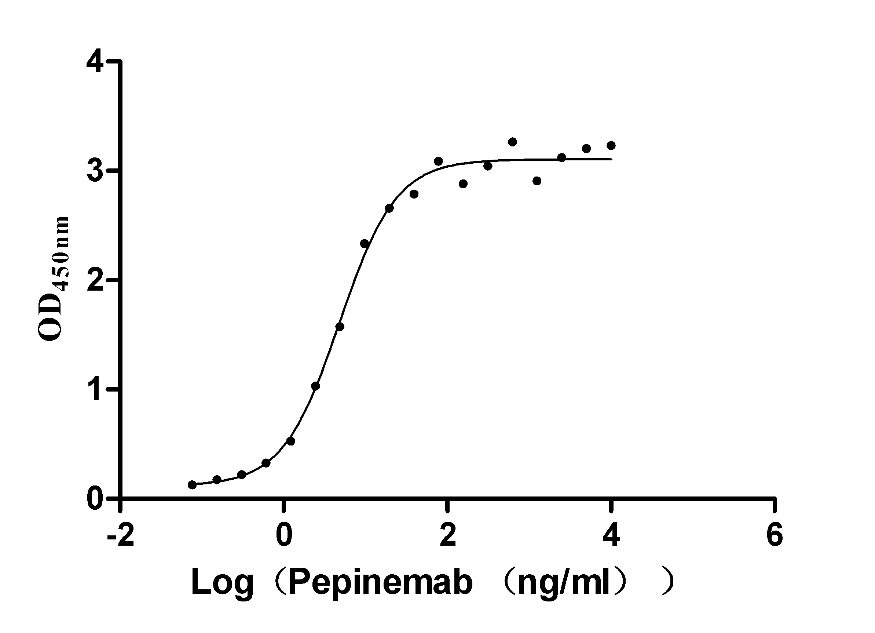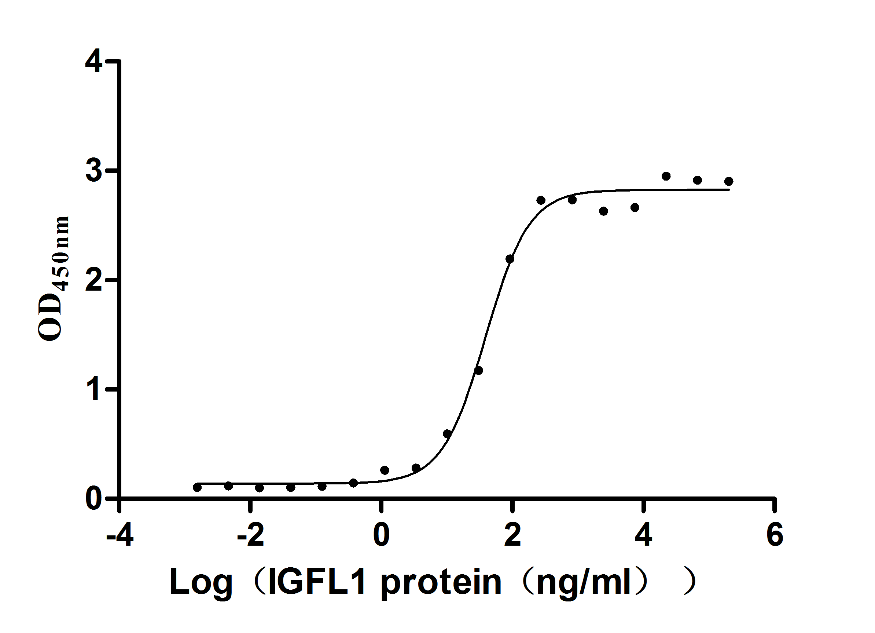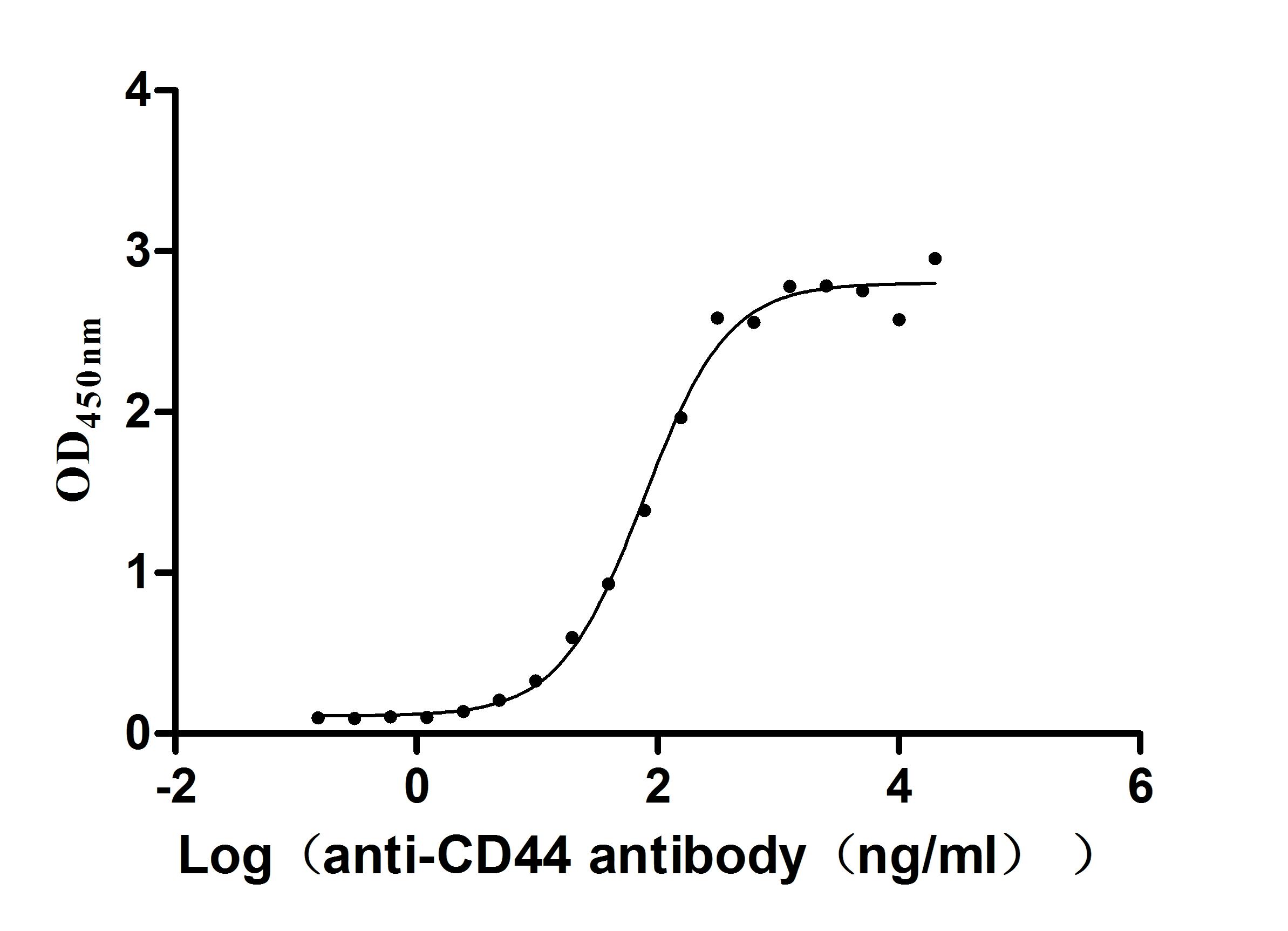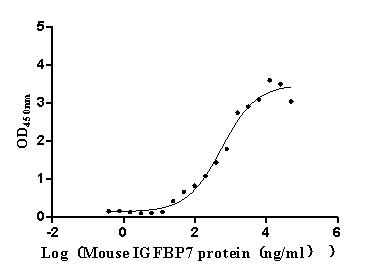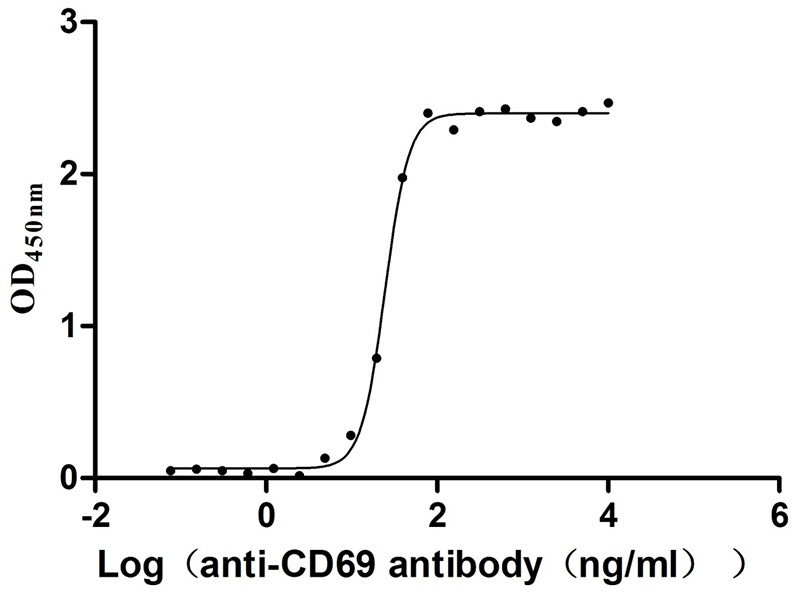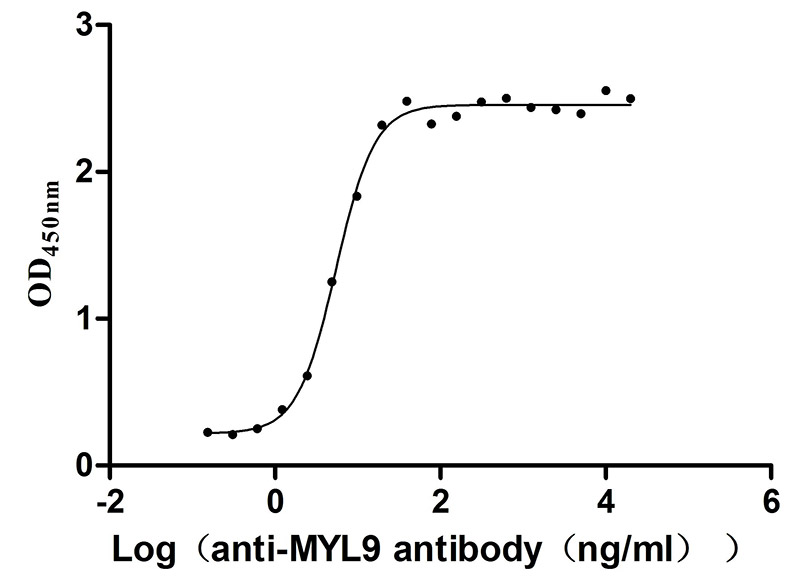Recombinant Mouse Proteoglycan 4 (Prg4), partial
-
中文名稱:小鼠Prg4重組蛋白
-
貨號(hào):CSB-YP018672MO
-
規(guī)格:
-
來源:Yeast
-
其他:
-
中文名稱:小鼠Prg4重組蛋白
-
貨號(hào):CSB-EP018672MO
-
規(guī)格:
-
來源:E.coli
-
其他:
-
中文名稱:小鼠Prg4重組蛋白
-
貨號(hào):CSB-EP018672MO-B
-
規(guī)格:
-
來源:E.coli
-
共軛:Avi-tag Biotinylated
E. coli biotin ligase (BirA) is highly specific in covalently attaching biotin to the 15 amino acid AviTag peptide. This recombinant protein was biotinylated in vivo by AviTag-BirA technology, which method is BriA catalyzes amide linkage between the biotin and the specific lysine of the AviTag.
-
其他:
-
中文名稱:小鼠Prg4重組蛋白
-
貨號(hào):CSB-BP018672MO
-
規(guī)格:
-
來源:Baculovirus
-
其他:
-
中文名稱:小鼠Prg4重組蛋白
-
貨號(hào):CSB-MP018672MO
-
規(guī)格:
-
來源:Mammalian cell
-
其他:
產(chǎn)品詳情
-
純度:>85% (SDS-PAGE)
-
基因名:Prg4
-
Uniprot No.:
-
別名:Prg4; Msf; SzpProteoglycan 4; Lubricin; Megakaryocyte-stimulating factor; Superficial zone proteoglycan) [Cleaved into: Proteoglycan 4 C-terminal part]
-
種屬:Mus musculus (Mouse)
-
蛋白長度:Partial
-
蛋白標(biāo)簽:Tag?type?will?be?determined?during?the?manufacturing?process.
The tag type will be determined during production process. If you have specified tag type, please tell us and we will develop the specified tag preferentially. -
產(chǎn)品提供形式:Lyophilized powder
Note: We will preferentially ship the format that we have in stock, however, if you have any special requirement for the format, please remark your requirement when placing the order, we will prepare according to your demand. -
復(fù)溶:We recommend that this vial be briefly centrifuged prior to opening to bring the contents to the bottom. Please reconstitute protein in deionized sterile water to a concentration of 0.1-1.0 mg/mL.We recommend to add 5-50% of glycerol (final concentration) and aliquot for long-term storage at -20℃/-80℃. Our default final concentration of glycerol is 50%. Customers could use it as reference.
-
儲(chǔ)存條件:Store at -20°C/-80°C upon receipt, aliquoting is necessary for mutiple use. Avoid repeated freeze-thaw cycles.
-
保質(zhì)期:The shelf life is related to many factors, storage state, buffer ingredients, storage temperature and the stability of the protein itself.
Generally, the shelf life of liquid form is 6 months at -20°C/-80°C. The shelf life of lyophilized form is 12 months at -20°C/-80°C. -
貨期:Delivery time may differ from different purchasing way or location, please kindly consult your local distributors for specific delivery time.Note: All of our proteins are default shipped with normal blue ice packs, if you request to ship with dry ice, please communicate with us in advance and extra fees will be charged.
-
注意事項(xiàng):Repeated freezing and thawing is not recommended. Store working aliquots at 4°C for up to one week.
-
Datasheet :Please contact us to get it.
靶點(diǎn)詳情
-
功能:Plays a role in boundary lubrication within articulating joints. Prevents protein deposition onto cartilage from synovial fluid by controlling adhesion-dependent synovial growth and inhibiting the adhesion of synovial cells to the cartilage surface.
-
基因功能參考文獻(xiàn):
- Intra-articular injection of human PRG4 in vivo in Prg4-/- mice prevented caspase-3 activation in superficial zone chondrocytes and was associated with a modest decrease in whole joint friction. PMID: 28604608
- Data indicate that Prg4 is needed for the temporomandibular joint integrity and long-term postnatal function. In its absence, progenitor cells near presumptive articular layer and disc undergo ectopic chondrogenesis and generate ectopic cartilage, possibly driven by aberrant activation of Hh signaling. PMID: 26945615
- Prg4 is needed for TMJ disc integrity and function and its absence leads to ectopic chondrogenesis and cartilage formation in conjunction with abnormal BMP signaling. PMID: 26534931
- Discs from Prg4 null mice had a significantly smaller mean transverse disc area, with a significantly larger proportion of this area occupied by the nucleus pulposus. PMID: 25907550
- PRG4 is a novel putative ligand for CD44 and may control synoviocyte overgrowth in inflammatory arthropathies via a CD44-mediated mechanism. PMID: 25708025
- Prg4-expressing cells at the embryonic joint surface serve as a progenitor population for deeper layers of mature articular cartilage. Prg4 is expressed by superficial chondrocytes in young mice but in deeper regions of articular cartilage in older mice. PMID: 25603997
- findings confirm the importance of lubricin in intrasynovial tendon lubrication. PMID: 24349551
- mechanical motion may induce Prg4 expression in the superficial zone of articular cartilage PMID: 24449269
- changes in synovial fluid proteins and PRG4 concentrations upon joint loading are mediated by cells within the joint, and that these changes may be used as quantitative indicators for the intensity and duration of acute joint loading PMID: 23506642
- Lubricin is transcribed, translated, and expressed by ocular surface epithelia. Lubricin presence significantly reduces friction between the cornea and conjunctiva and its deficiency may play a role in promoting corneal damage. PMID: 23599181
- lubricin has roles in boundary lubrication, and cell survival PMID: 23530215
- Blunted PTH anabolic responses in adult Prg4 mutant mice are associated with altered biomechanical impact secondary to joint failure. PMID: 21932346
- lubricin expression has an effect on the viscoelastic properties of tendon fascicles PMID: 21821131
- the absence of lubricin is associated with increased interfascicular friction and that lubricin may play an important role in interfascicular lubrication PMID: 20886657
- These findings suggest that PRG4 plays a significant role in preserving normal joint structure and function. PMID: 20191580
- Expression is characteristic ofmyxoid liposarcoma and is also a frequent finding also in various other sarcomas. PMID: 15201968
- Data describe the expression of Prg4 mRNA during mouse joint development and in lubricin-mutant mice PMID: 15719068
- lubricin degradation occurring in inflammatory joint diseases predisposes the cartilage to damage PMID: 17968947
顯示更多
收起更多
-
亞細(xì)胞定位:Secreted.
-
組織特異性:Highly expressed in cartilage, bone and liver and weakly expressed in heart, brain and muscle. Expressed in the surface chondrocytes and in synovial intimal cells. Isoform B is expressed in bone, small intestine, muscle, testis, heart, liver and lung. Iso
-
數(shù)據(jù)庫鏈接:
Most popular with customers
-
Recombinant Human Semaphorin-4D (SEMA4D), partial (Active)
Express system: Mammalian cell
Species: Homo sapiens (Human)
-
Recombinant Human IGF-like family receptor 1 (IGFLR1), partial (Active)
Express system: Mammalian cell
Species: Homo sapiens (Human)
-
Recombinant Rat Intestinal-type alkaline phosphatase 1 (Alpi) (Active)
Express system: Mammalian cell
Species: Rattus norvegicus (Rat)
-
Recombinant Macaca fascicularis CD44 antigen (CD44), partial (Active)
Express system: Mammalian cell
Species: Macaca fascicularis (Crab-eating macaque) (Cynomolgus monkey)
-
Recombinant Mouse Complement component C1q receptor (Cd93), partial (Active)
Express system: Mammalian cell
Species: Mus musculus (Mouse)
-
Recombinant Human Early activation antigen CD69 (CD69), partial (Active)
Express system: Mammalian cell
Species: Homo sapiens (Human)
-
Recombinant Human Myosin regulatory light polypeptide 9 (MYL9) (Active)
Express system: Yeast
Species: Homo sapiens (Human)
-
Recombinant Human C-C chemokine receptor type 6(CCR6)-VLPs (Active)
Express system: Mammalian cell
Species: Homo sapiens (Human)


